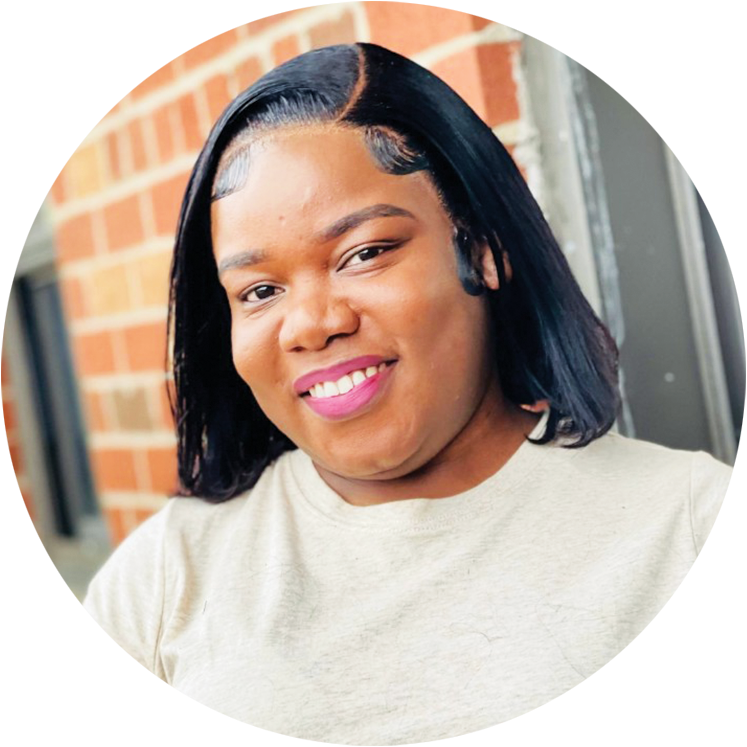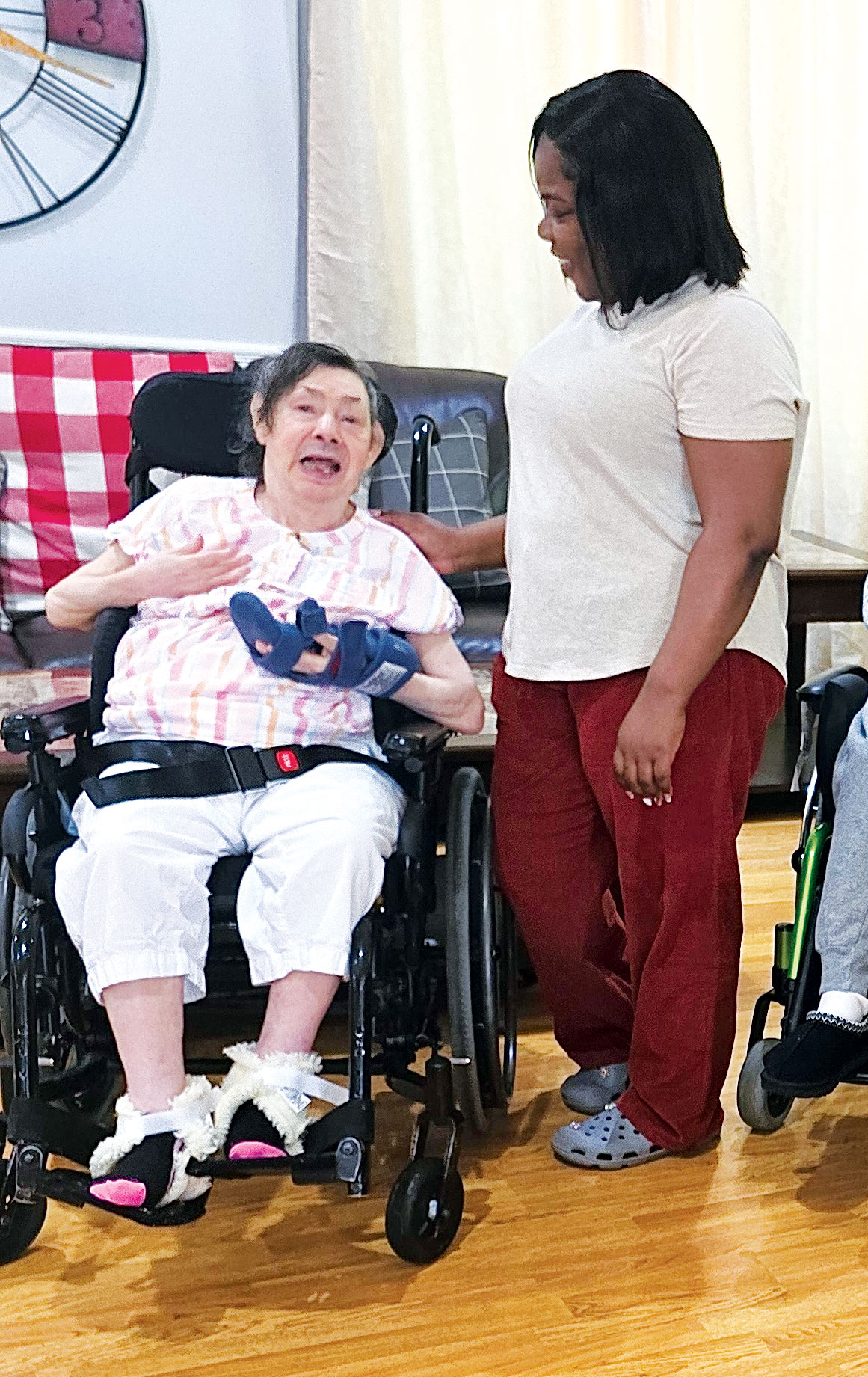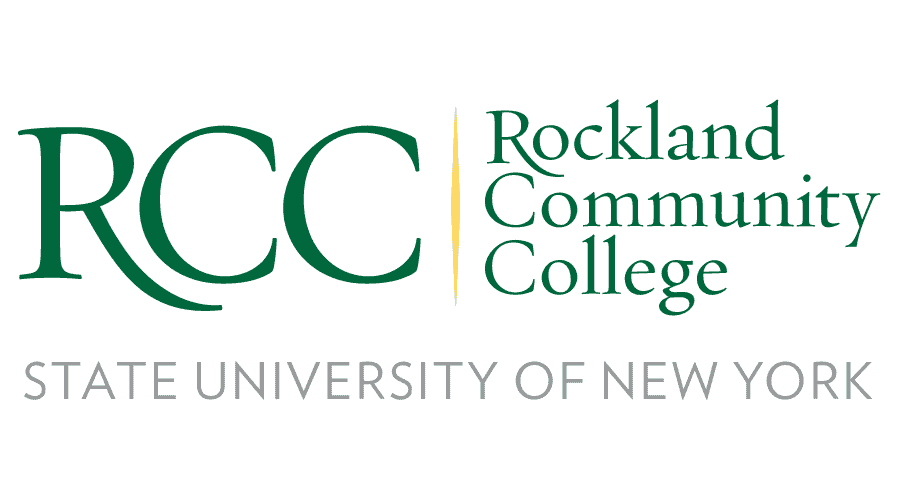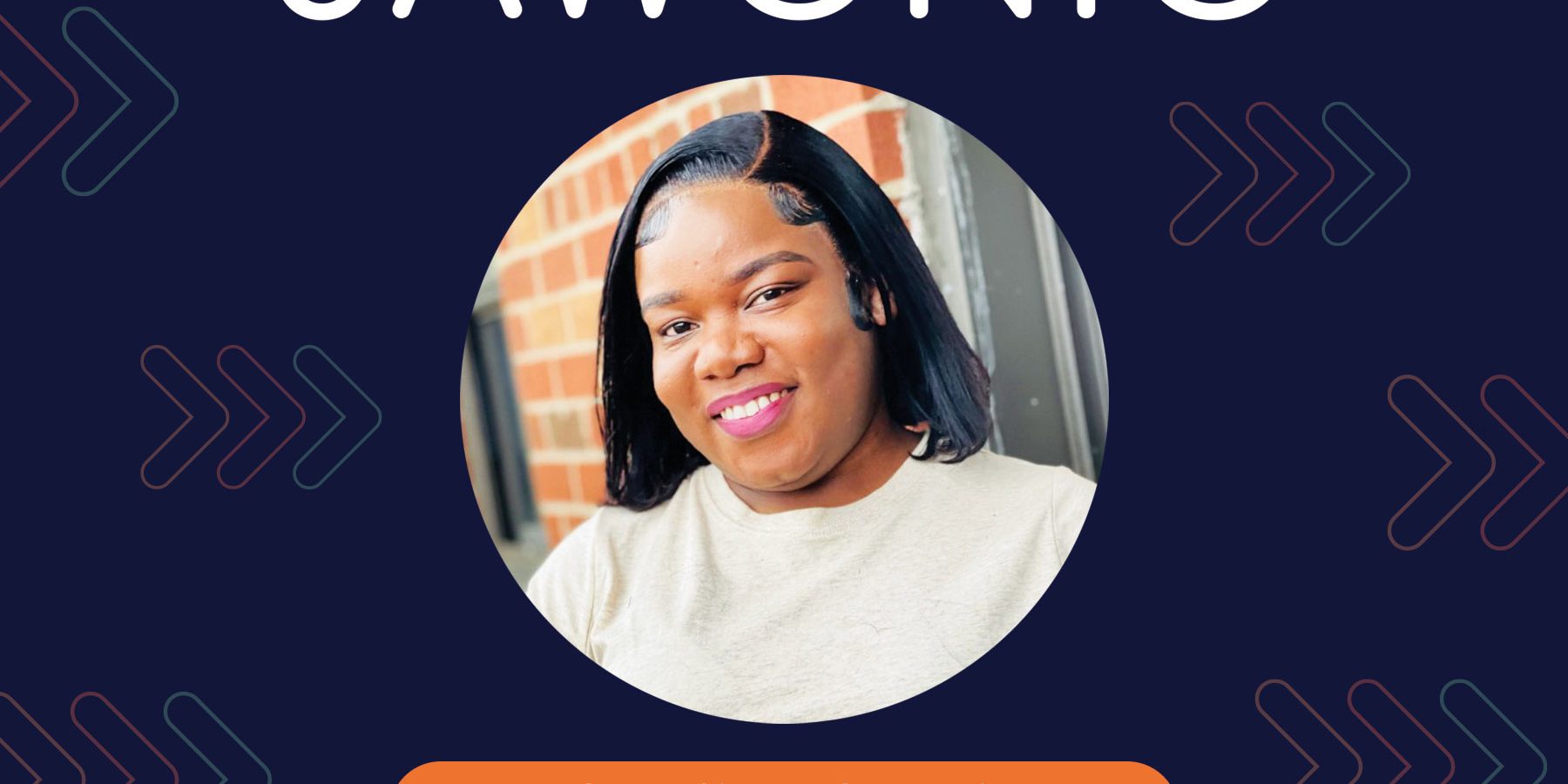

“Jawonio is a truly special place to work and help those who are truly in need. What is more precious in life than helping others? ”
Sheslie Blancin, Direct Support Professional, Jawonio
A Conversation with Sheslie Blancin:
Passion, Purpose, and the Power of Support at Jawonio
Today, we’re incredibly excited to share an insightful interview with Sheslie Blancin, a dedicated Direct Support Professional (DSP) at Jawonio. Sheslie’s journey from Haiti to the United States, her unwavering commitment to helping others, and her pursuit of growth truly embody the spirit of our organization. Join us as we delve into her experiences, inspirations, and the profound impact Jawonio has made in her life.
DH: Sheslie, thank you for sharing your story and Jawonio journey with us. Can you start by telling us a little about your family background and what life was like for you growing up?
SB: It’s my pleasure! My name is Sheslie Blancin, and I’m married to a wonderful man, Eberson Blancin. I was born and raised in Port-au-Prince, Haiti, in a large family of eight children – four boys and four girls. I’m the second oldest. We were a big family, so we didn’t always have everything we wanted or could afford luxuries, but we lived in perfect harmony, in an atmosphere full of love. Our parents did everything they could to feed us, dress us, put a roof over our heads, educate us, and meet our basic needs.
DH: You mentioned your education in Haiti was quite extensive. Can you tell us about your schooling and what you studied?
SB: Yes, classical studies in Haiti involve three years of kindergarten, nine in primary school, and four in secondary school. I attended four different schools throughout my journey. I started at Logos Center for kindergarten, then Immaculate Conception, and Greater Works Academy for most of my primary and secondary education. Unfortunately, I couldn’t complete my second year of secondary school there because of the devastating earthquake on January 12, 2010. My family had to leave Port-au-Prince and move to Les Cayes, my mother’s hometown in the South. There, I went to Saint Laurent College for my last three years of secondary school.
After that, I returned to Port-au-Prince and attended the Haitian University State at the National Higher Institute for Midwifery Training. So, I am a midwife by profession. I’ve worked for the Southern Health Directorate and Doctors Without Borders.
DH: Would you say your move to the United States in 2023 was difficult or an opportunity and under what circumstances brought you to that decision?
SB: Yes, I would say coming to the United States in July 2023 was a huge opportunity for me. For several years, Haiti has been going through extremely difficult times. Armed gangs are spreading terror everywhere, taking over territories, killing, stealing, and rape. I believe if I was still there I would have experienced terrible violence, or could have lost my own life I were still there because no one is spared. It was a matter of safety for me and seeking a better life.
DH: Well we are certainly glad that you are safe! Let's switch gears now, who would you say has been your biggest role model in life, and why?
SB: My mom, Ms. Marie Rosemonde Richemé Aubrit, is definitely my biggest role model. She’s a true figure of strength, courage, and resilience. She inspires me with her joy of living, her love of life and her loved ones, her respect, and her generosity. She’s my mentor; she taught me to never give up because in life there’s always a glimmer of hope, and to fight for what I want.
DH: That is really wonderful Sheslie. Before coming to Jawonio, did you have any experience or exposure to people with disabilities?
SB: Growing up, I met several people with disabilities in my neighborhood. They were living in very difficult and precarious conditions. They suffered all kinds of abuse, and it was truly sad to witness. I always felt sorry for them, but the system in Haiti doesn’t offer adequate protection and special care for them. I really hope one day my country will be truly organized, and this group of people will finally enjoy their rights in society. I didn’t even know that there were companies that took care of people with disabilities before I came to the US.
DH: How did you discover Jawonio and decide to work here?
SB: After immigrating to the United States I began looking for a job. I had met a friend at BOCES Adult Education Program where I was learning English as a Second Language. So during this time, they told me that an agency would be coming to Konbit Neg Lakay—a Haitian services organization for a hiring fair.. I was thrilled to meet and speak to the staff at Jawonio and learned about the services the agency provides. I immediately told myself I would go for it! As soon as I heard that Jawonio was about helping people and those in need, I was up for it. Ever since I was hired by Jawonio, I have been continuously learning and feel part of the mission.
DH: Can you tell us about your current role at Jawonio and share a story that has made an impact on you?
SB: I was hired as a Direct Support Professional and am currently at the Jawonio Altman Court residence, where I work with eight beautiful and nice women. That’s where the magic happens! As a DSP, my role is to meet their needs and help them achieve their respective goals.
The story that has made an impact on me really illustrates the work we do. There’s one individual who usually takes her medicine with pudding. One day, I poured her medicine into vanilla pudding and gave it to her. She just put the cup on the table and refused to take it. I asked her to take her meds, but she completely refused. Then I thought, “What did I do wrong? Let me talk to her.” I sat next to her at the table and asked her what was wrong, why she was refusing her meds today. After much talking, she finally told me she wanted chocolate pudding.
You might think, “What’s so special about this story?” What I wanted to highlight is that an individual has a goal—to take her meds daily—and my role as a DSP is to ensure that they reach their goal. I’m committed to promoting the emotional, physical, and personal well-being of the people I support. So, I sat down and talked with her with respect, which is one of Jawonio’s core values. And she ended up achieving that goal for the day. It’s about understanding their individual needs and preferences.

DH: What are some of the biggest challenges you face in your daily work as a DSP?
SB: Life itself is a challenge, and no matter what we take on and we will always find challenges. Through these challenges, we develop new skills and truly learn how far we can go. In my daily work as a DSP, one of my biggest challenges is working with people who cannot express themselves with words or gestures. It’s not easy; I can’t read minds. I often wonder if their desires are truly fulfilled. To try and meet their needs, I follow their individual service plan to help them reach their goals. Most importantly, I use my judgment well and often put myself in their place to serve them better.
Another challenge, and I’m sure all DSPs everywhere face this, is the salary. It’s true that the work DSPs do is priceless, and our primary motivation is the desire to help those in need. But with the cost of living, I often have to have a second job or work overtime to meet my needs.
DH: You recently enrolled in the Rockland Community College Micro-Credentialing program for Direct Support Professionals? What motivated you to join, and what has your experience been like so far?
SB: Last year at the Annual Core Training for Community Living Services, Robert Sbordone, our Jawonio Director of Training, came to the residence, talked about the DSP Micro-Credentialing program. He really encouraged all DSPs to take the classes. I was surprised to find that I could develop important skills to become a DSP, since it is what I routinely do. So, I was super excited to learn about this micro-credential. Moreover, he told us it was free, and Jawonio will cover all the costs. The best part is that after obtaining the credential, you’ll be rewarded with a salary increase. Break out of the routine, reward, salary increase—why not? I’m not the type to let good opportunities slip away, so I registered!
The DSP Micro-Credentialing program is so instructive. It teaches a broad understanding of the roles and responsibilities of human services professionals. Through this program, I’m acquiring new knowledge, skills, and attitudes, allowing me to do my job better, get out of the routine, and truly understand the work. It elicits specific changes in my understanding of my role, improving my abilities to meet the demands of my job not by what I think is right, but by what truly is. And what’s more, this credential is included in the educational opportunities of Social and Behavioral Sciences—already a step toward college!
Honestly, this program makes me see myself and my job from another angle. I would advise everyone working as a DSP to go for this program; you will not regret that decision.
DH: With family life, work, and now the micro-credentialing program, how do you effectively balance your time?
SB: To balance my time effectively, I apply a few key principles:
The first thing is determination. I know what I want, and I fight to achieve it. It’s one of my life’s rules. I chose to join the program, and then I established principles by putting things into perspective. I work at Jawonio in the morning, so I have the evenings to take care of my family life, and at night I devote at least one hour to the course. The advantage is that it’s an online course, so the times to take it can vary depending on your availability. The only thing is you must be very disciplined and motivated.
The second thing is time management. I plan my days. I dedicate one hour for the lesson in my 24 hours. I haven’t always respected it perfectly, but I always do my best to make up for it if I ever miss a day. And one very important thing: I limit my time on social media.
And the last one, I choose my priorities. I won’t be in the program forever, and I chose to join it for beneficial reasons, so I’m prioritizing it. It was much easier for me because I don’t have children yet, but having children is not an excuse for not joining the program. Imagine how many times you spend on social media every day. Focus on priorities rather than just needs for a period; the course will not last forever. And trust me, if you want it, you will do it.
SB: What I see in my role at Altman, in terms of collaboration is how our Jawonio residential, nursing, and day program staff work together to help everyone reach their respective goals. Person-centered care is what makes this collaboration special. Everyone is included in the services and care they receive. They focus on each individual and their specific needs to make the best decisions about the activities that will best meet the needs of each person.
DH: What makes Jawonio a special place to work for you? And what would you say about career opportunities to those who might consider becoming a DSP here?
SB: What makes Jawonio special is that as a service organization, they allow you to help those who are truly in need. What is more precious in life than helping others? At Jawonio, positive values are the foundation of the agency, diversity and inclusion are promoted, and all voices count. Considering a career as a Direct Support Professional here is like laying a foundation, because Jawonio gives staff the opportunity for growth. You can start as a DSP, and if you are dedicated, become an assistant manager or manager. And if you are thinking about studying, as Jawonio encourages us to do, you can have a professional career and climb the ladder.
The aspect of climbing the ladder is very important to me, and all prospective employees should know that. I have found that Jawonio not only cares about us as employees, but as a person as well. Jawonio has given me the opportunity to grow intellectually and financially.
DH: Looking ahead, where do you see yourself in the next two to five years?
SB: In the next two to five years, I see myself as a mother in my personal life, and in my educational and work life, I will complete my degree, and them you will find me even higher on the Jawonio ladder.
DH: We want to thank Sheslie for saying yes to being in the spotlight this month and for sharing her story, her love of supporting people in need and her determination in reaching her own goals. Please read two testimonials below from Peter Marino, of Rockland Community College and our own Robert Sbordone, who share their wonderful words about Sheslie.

Peter Marino | MA Instructional Coordinator
Workforce Innovation, Adjunct FacultyPsychology, Rockland Community College:
“Sheslie’s performance this semester is a model of what this program can offer when combined with a strong work ethic and a caring heart. Her journey highlights the powerful role of education in transforming careers—and lives. We look forward to seeing how Sheslie continues to grow and impact those she supports.”

Robert Sbordone | Director of Training
“Sheslie has gone above and beyond in NADSP eBadge Academy submissions. It’s clear Sheslie invested significant time and care into her studies. Her strong work ethic and eagerness to master the trade is the model for real success in the human services field. Sheslie detailed thoughtful reflections showing how deeply she cares about this work. Not only did Sheslie excel academically
— she demonstrated the compassion and reliability that make a great service provider.”
If you would like to learn more and apply for a new career as a Direct Support Professional, please visit: jawonio.org/careers
SO MUCH GOOD HAPPENS HERE.
Join our team and start an amazing career in inspiring children and adults everyday.
Click on the button below to find your passion and join our Jawonio Team.
Thank you to our Jawonio Community for reading and sharing our Blogs! If you have ideas or suggestions for us, or personal stories you would like to share, please contact Diana Hess, CCO, at diana.hess@Jawonio.org
Please visit Jawonio.org/careers








